
New Floods in Central Chile and the Heroic Resistance of the Popular Masses
Hereby we publish an unofficial translation of an article by Chiripilko Press and Popular Action Brigade:
Introduction
From Saturday the 19th to Tuesday the 22nd of August, new intense rains caused gigantic disasters in the O’Higgins, Maule, Ñuble and Bio-Bio regions. As in June, the Maule region was one of the most affected, especially the provincial capital Curicó and rural peasants areas such as the Mataquito valley.
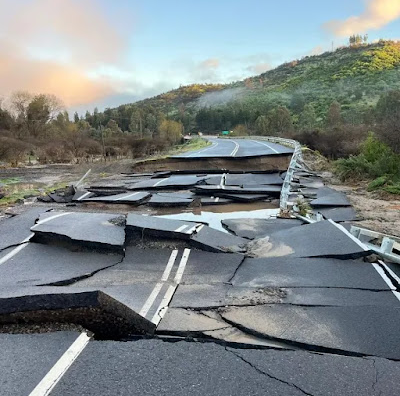
The effects have caused lost of human lives, thousands of homeless and isolated, cultivated lands and homes completely flooded, roads and highways blocked, bridges destroyed, vehicles on the roads, multiple sinkholes, drowned and dragged animals by the currents of the rivers.
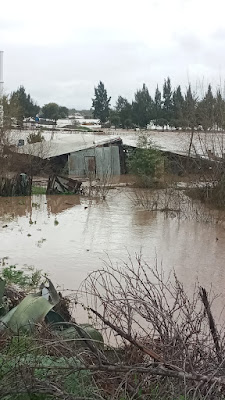



The places look like war zones, and as incredible as it sounds, reality is stranger than fiction.
Rural and peasant areas
In the case of the Mataquito Valley, the first areas to suffer blows were the ones located in the hills, which are rural par excellence. There, the quick and unstoppable flooding of the estuaries began to cut off the roads, many of which, due to the abandonment of the old State and the municipalities, are still only dirt or gravel. The power line collapsed, which meant the suspension of the supply. Multiple fallen trees and sinkholes left the masses who live in those areas isolated earlier. Some areas that we can mention are Los Coipos, Caone and Alto Caone, El Buche, Espinalillo, Bóquil, Tilicura and Los Sauces among others.
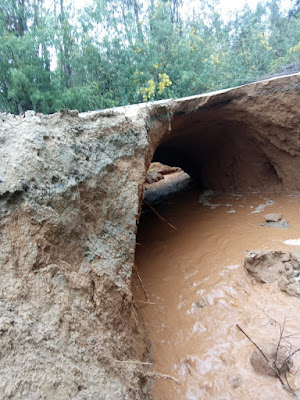
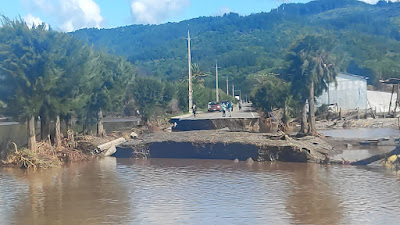
The torrential rains also caused the rivers to burst their banks with greater force than in the floods of last June. The dams and reservoirs controlled by large bourgeoisie and big landlords who by the way hoard and steal water in times of summer and drought, were in danger of being destroyed and overflowing, they quickly opened the floodgates, releasing an immense mass of water that, mixed with rainfall and water coming from the Andes mountain range, produced the worst floods that have been recorded for decades in the country.
The areas closest to the river basin, as in the case of the Mataquito River, were under water and, just like two months ago, the center of the town of Licantén was devastated. However, the disaster was greater. The areas of Rauco, Majadilla – Palquibudis, La Huerta, Villa Prat, Huaquén, Rincón de Mellado, Paula – Hualañé, Constantué, Placilla, Idahue, Lora and many others saw their crops, houses, trees, electric poles, roads and what hurts the most – a lifetime of work – destroyed.

The entire Mataquito Valley was left without electricity and drinking water since the start of the rains. Many have lost food and medicine that needed to be kept refrigerated. Some people have had to resort to the use of fuel generators and, as a true blow, the people see with horror and indignation the announcement of the next rise in diesel and gasoline for this week by more than $30 per liter. Another unjustified price rise is the potato. Before the June floods the sack was worth between $10,000 to $12,000. Later, the value of the sack of potatoes rose to $20,000 and today, after the tragedy in August, the value of the sack fluctuates between $35,000 and $40,000. Antonio Walker, Piñera’s former minister of agriculture and today president of the big landlords’ union, The National Society of Agriculture (SNA) justifies this increase because it affirms that last season potatoes presented a drop in profitability, so fewer producers would have planted potatoes. However, neither Walker’s claims nor the flooding should affect the price of this food since most of it was harvested in April.
Telecommunications are extremely unstable and at times null. In short, everything indicates that the State at the service of capital and the big landlords, not even in the worst catastrophes will stop squeezing every last drop of blood and sweat from the people.
The “authorities” live in their circus and media show accusing each other of being responsible. For example, on various national TV channels they have interviewed the mayors of Licantén, Hualañé and Curicó who accuse that aid from the central government has been delayed. However, the masses are already accusing that many of the things donated by people last June were not delivered to those who needed them, rotted or were destroyed with the new floods. Such is the case of Licantén, where mattresses, stoves and other things were lost inside the municipal library.
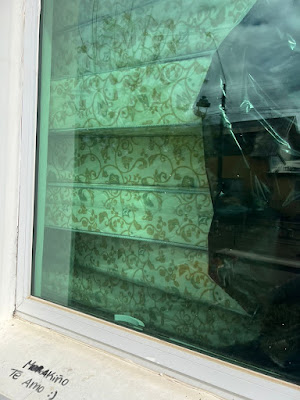


The aid that the government promised for peasants and victims last June never arrived. Reality also shows that although it was known that new rain was coming, little and nothing was done in terms of infrastructure by the authorities to prevent this catastrophe.
Curicó and its surroundings
Equally affected has been the city of Curicó itself and the surrounding areas, where the catastrophe revealed the negligence and irregularities with which the urbanization of cities is planned, specifically the provincial capital. The Zapallar Park located in the eastern and wealthy sector of the city has been the symbol of the lack of regulation in terms of bylaws and building permits. The construction company in charge, owned by the family of Rodrigo Galilea, former mayor and current senator of RN (National Renovation) and candidate for the presidency of the political party. A situation in which the authorities carry out a real witch hunt, looking for the person(s) responsible for this irregular construction without questioning the housing policies, hand in hand with the need that exists to access housing.



The provincial capital was basically under water because of the crossing rivers that flooded different parts of the city, because of this pipes and drains exploded, generating more flooding, resulting in flooded lands and houses of the populations of Boldo, La Marquesa, La Bombero Garrido, the Vatican, John Kennedy and many others. However, the medias focused on the upper neighborhood of Curicó, making it the center of attention, making invisible the different complexities in parallel in various areas. Like the rural sectors, who were affected not only by the rain, but by floods that devastated houses and different infrastructures in Upeo, leaving some 300 people isolated, cuts and bridge collapses in Romeral and Sagrada Familia, that left these localities without communication and basic service to hundred of families that has received none or too little help by the authorities.
Pregnant women, children, elders, people with disabilities, etc., resent the lack of medicines and access to services necessary for their health. And in cases like Los Niches, their schools were affected by water and mud, such are the cases of La República de Italia and Colegio Estados Unidos who, based on the collaboration of their educational community and neighbors, have managed to recover the premises for their soon operation.
The people’s law of failing and getting up again always prevails. Despite the abandonment of the authorities, the neighbors themselves have already begun the tasks of mutual support and solidarity. By hand, it has been possible to transfer the sick, wounded and victims in boats through the streams that used to be streets. With the willpower steeled by years of work, the peasants have opened roads, enabling routes, they have shared their food with those who need it most. Collection campaigns are already being deployed in various parts of the country. Complaints against food hoarders and speculators are unleashed. Propaganda actions unfold.


The call is to intensify solidarity campaigns and as experience in past floods taught us, everything collected should not be delivered to the municipalities but directly to the affected masses.
Facing the catastrophe: Only the people help the people!
Faced with the abandonment of the old State: It is right to rebel!


